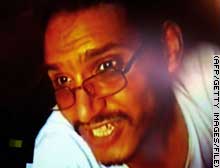|
|
Home | World | U.S. | Weather | Business | Sports | Analysis | Politics | Law | Tech | Science | Health | Entertainment | Offbeat | Travel | Education | Specials | Autos | I-Reports |
|
|
|
Home | World | U.S. | Weather | Business | Sports | Analysis | Politics | Law | Tech | Science | Health | Entertainment | Offbeat | Travel | Education | Specials | Autos | I-Reports |
|

Story Highlights• NEW: Anbar Salvation Council says it killed Abu Ayyub al-Masri• NEW: Council leader says al-Masri's body was dumped in battlefield • Reports of death have not been confirmed • U.S. to let family members visit seven Iranians being held in Iraq Adjust font size:
BAGHDAD, Iraq (CNN) -- The Anbar Salvation Council claims it killed al Qaeda in Iraq leader Abu Ayyub al-Masri in fighting Tuesday. Sheikh Abdul Sattar Abu Reesha -- head of the anti-al Qaeda in Iraq tribal alliance -- said fighters, with help from tribes in the Niba'ie area, killed al-Masri and eight of his aides in a battle Tuesday morning. Ali al-Dabbagh, spokesman for Prime Minister Nuri al-Maliki, passed along reports about the death but cited tribal sources and not Iraqi intelligence. He said the government won't be able to confirm al-Masri's death until it makes an identification of the body. "Iraqi security forces do not have the body," al-Dabbagh said on Iraqi state TV. "Iraqi security forces and Multi-National Forces are trying to retrieve the body for visual identification and DNA tests." (Watch how mostly Sunni tribes reportedly were fighting against al Qaeda in Iraq Abu Reesha said "eyewitnesses saw their bodies dumped in the battlefield" but did not say where the bodies were. Abu Reesha provided details of the fighting in a phone interview with al-Iraqiya state TV, a national network. Al-Masri -- also known as Sheikh Abu Hamza al-Muhajer -- succeeded Abu Musab al-Zarqawi as the leader of al Qaeda in Iraq after his death in a U.S. airstrike in June. A statement from an Islamist umbrella insurgent group with which al-Masri is affiliated denied that he had been killed. "The Islamic State of Iraq would like to assure the nation that the sheikh, Abu Hamza al-Muhajer, is safe, may God protect him, and he is still battling the enemies of God," said a Web posting, which cannot be authenticated by CNN. The reports emerged after a confrontation Tuesday between Sunni tribes and al Qaeda in Iraq at a bridge in an area under Sunni tribal control, al-Dabbagh said. If Sunni militants had information that led to al-Masri's death, it may be a sign of a rift among Sunni militants in Iraq, said CNN terrorism analyst Peter Bergen. (Full story) A Pentagon statement said U.S. forces have not confirmed the reports of al-Masri's death, but they are working with Iraqi officials to determine whether they're true. John Roberts, acting spokesman at the U.S. Embassy in Baghdad, said he had no information but added he "would not be disappointed" if the reports of al-Masri's death were true. In February, Iraq's Interior Ministry claimed Iraqi security forces wounded al-Masri in another clash north of Baghdad, but the U.S. military cast doubt on that report. The ministry never backed away from its claim. U.S. to let Iranian family members visit detaineesThe United States has agreed for the first time to allow family members to visit seven Iranians it is holding inside Iraq, a U.S. military official said Tuesday. The official said the visit could happen as soon as arrangements are made for the family members to travel into Iraq. A senior Defense Department official later told CNN to expect the arrangements to be made public beginning Wednesday. The official stressed that the visitation will be families only and not by Iranian officials as the Iranians had also sought. A State Department source said that "just who and who is not family" will need to be determined. The source said only close family would be allowed to visit. The United States says the seven men are members of Iran's Al-Quds force, an elite unit of the Revolutionary Guard, and are involved in financing and training insurgents as well as bringing in advanced armor-penetrating roadside bombs to attack American troops. The United States had previously considered letting relatives visit the men, but that plan was dropped after several British military members were seized by Iran earlier this year. The U.S. official declined to speculate on the timing of the decision but noted it comes as Iraqi, Iranian, American and other officials plan to meet in the Egyptian resort town of Sharm el-Sheikh to discuss ways to reduce violence in Iraq. The United States is looking for ways to encourage Iran to stop shipping its weapons technology into Iraq. The detainees already have had two visits from the International Committee of the Red Cross. It is believed the arrangements for the families' visits will be made with the cooperation of the Red Cross and the Iraqi government. The status of the seven Iranians is reviewed every six months, and they may eventually be turned over to the Iraqi government for possible release or prosecution by Iraqi authorities. Other developmentsCNN's Saad Abedine, Jomana Karadsheh, Basim Mahdi and Michael Ware contributed to this report.  The leader of al Qaeda in Iraq, Abu Ayyub al-Masri, appears in a video in which he explained how to make bombs. Browse/Search
VIDEORELATEDSPECIAL REPORT
• Interactive: Who's who in Iraq
• Interactive: Sectarian divide
• Timeline: Bloodiest days for civilians
|